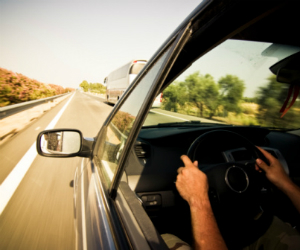Cruise Control May Prevent Speeding, But Slow Reaction Times
 As cars become increasingly automated, researchers are looking at who’s the better driver: the human or the car.
As cars become increasingly automated, researchers are looking at who’s the better driver: the human or the car.
Most cars and trucks now come equipped with cruise control–which allows a car to automatically maintain a constant speed without input from the driver–and many newer vehicles have advanced cruise control (ACC) systems that automatically adjust a car’s speed to maintain a safe distance from the car ahead.
A recent study from psychological scientists Mark Vollrath, Susanne Schleicher, and Christhard Gelau found that cruise control and ACC systems can have both positive and negative effects on driving safety.
Previous research has shown some benefits to using cruise control systems, but there may also be some increased risks. Several studies have found that drivers using cruise control systems are more likely to obey speed limits. However, a 2013 study from the University of Strasbourg found that drivers using cruise control reported increased rates of drowsiness while driving. Thus, Vollrath and colleagues hypothesized that when drivers were using cruise control or ACC systems, they might speed less often, but would also be more distractible and less attentive to their surroundings.
The researchers used a driving simulator to see how 21 participants would adapt to using cruise control and ACC in a variety of conditions.
Participants were instructed to use the cruise control systems as often as possible while driving safely through a course that included realistic challenges, such as traffic jams, steep curves, speed limit variations, and inclement weather.
As predicted, drivers were much less likely to speed when they were using cruise control and ACC. When they were using cruise control or ACC, drivers tended to maintain speed about 5-10 km/h slower than when they were driving manually.
However, cruise control and ACC also seemed to slow drivers’ reaction times. Drivers took around 5 seconds longer to react when they needed to slow down and maneuver around obstacles like sharp curves when they were using cruise control or ACC.
There was also evidence that drivers might be relying on the automatic system to detect other cars or obstacles better than they themselves could. For example, drivers drove much faster when they encountered foggy conditions when they were supported by ACC.
But, the researchers surmise that when drivers don’t have to continuously watch and adjust the speed of the car they may become less attentive to their surroundings.
“As drivers rely on the ACC system they do not monitor the surrounding as carefully and might thus lose some of their situation awareness,” Vollrath, Schleicher, and Gelau write in the journal Accident Analysis and Prevention.
Reference
Vollrath, M., Schleicher, S., Gelau, C., (2011). The influence of Cruise Control and Adaptive Cruise Control on driving behaviour – A driving simulator study. Accident Analysis and Prevention, 43(3), 1134–1139. DOI: 10.1016/j.aap.2010.12.023





Comments
Interesting article – has the group done any other more research other than the 21 people. Getting data from real world driving such as dash cams or electronic storage device to monitor driving habits with cruise. Also how people react in the real world settings not just a simulator.
APS regularly opens certain online articles for discussion on our website. Effective February 2021, you must be a logged-in APS member to post comments. By posting a comment, you agree to our Community Guidelines and the display of your profile information, including your name and affiliation. Any opinions, findings, conclusions, or recommendations present in article comments are those of the writers and do not necessarily reflect the views of APS or the article’s author. For more information, please see our Community Guidelines.
Please login with your APS account to comment.